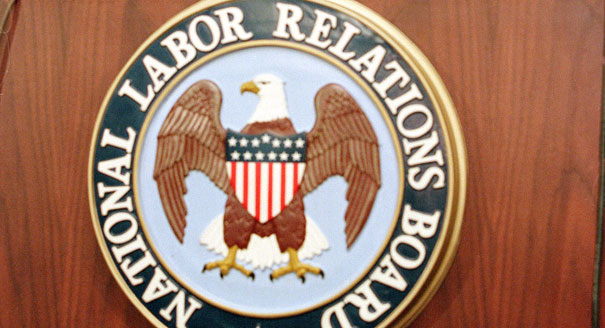

Share
In what would be a major advance for workers’ use of the ultimate economic weapon, the strike, the National Labor Relations Board’s top enforcement officer, its general counsel, is proposing that companies must prove – not just state – that only by hiring “permanent replacement” workers can they keep going economically, after the firms force their own employees to strike.
Needless to say, the company involved, United Site Services of California, is screaming about General Counsel Richard Griffin’s stand, contained in a brief submitted to the full NLRB. And the union in the case, Teamsters Local 315, is cheering Griffin on and has filed its own supporting brief, too, laying out the case against the replacements, often known as “scabs.”
The case’s outcome is important: A board decision agreeing with Griffin and the union would help show, as a practical matter, if strikes will again be a viable economic weapon for workers. That’s because there are two types of strikes, and the NLRB treats them differently:
Strikes forced by employer labor law-breaking, formally called “unfair labor practices strikes.” The law-breaking forces workers to walk out. When the board or its officials rule that ULPs forced a strike, the employer cannot legally hire permanent replacements.
Economic strikes, where the firm forces the workers to walk after bargaining over wages, benefits and working conditions breaks down. In economic strikes, the NLRB allows employers to hire “permanent replacements” to keep the business going.
Now, firms can assert “economic necessity” – keeping the doors open and production moving – to hire the replacements during economic strikes. But they don’t have to prove it. That gives them a big incentive to break strikes by hiring the “permanent replacements.”
And they have. That’s one reason for the huge decline in the number of strikes. Federal data show that last year there were only 12 strikes and lockouts, combined, affecting 47,000 workers nationwide. They were out for less than 0.05 percent of total worker-days in the U.S. The strike-lockout record was set in 1952: 470 strikes or lockouts, idling 2.75 million workers.
Not forcing employers to prove the need for hiring “replacement workers” takes the strike weapon out of workers’ hands, says pro-union Philadelphia labor lawyer Mark Kaltenbach. “The right to strike will only become a reality when the board jettisons that presumption” that employers can hire permanent replacements, he wrote in the On Labor blog.
Kaltenbach, author of a paper on the right to strike and “replacement workers,” notes that even the U.S. Supreme Court has recognized that hiring permanent replacements is “inherently destructive” of the right to strike. But it hasn’t questioned employers’ assertions of the need for the replacements. The NLRB should demand “prove it” for need, Kaltenbach says.
So does Griffin. So do the Teamsters.
The Supreme Court “pointed out that the board does not require an employer to show that it was necessary to use permanent replacements in order to keep the business operating. At bottom, this is the very question the General Counsel now seeks to place before the board,” Griffin’s brief says.
Nothing in subsequent cases “precludes the board from considering the GC’s argument to overrule Hot Shoppes,” the original case, decades ago, that laid down rules for hiring permanent replacements.
“To the degree Supreme Court cases have…cited back to Hot Shoppes for the proposition that employers have a free hand in permanently replacing economic strikers, such reliance does not preclude the board from reconsidering Hot Shoppes,” Griffin adds.
Speaking for Teamsters Local 315, pro-worker attorneys Andrew Baker and Lorrie Bradley of Oakland, Calif., went into more detail.
“The crux of” United Site Services’ “argument is the Supreme Court and the board recognized an employer’s hiring of permanent replacements is in and of itself the legitimate justification for hiring permanent replacements and denying striking employees their jobs upon conclusion of a strike,” Baker and Bradley said.
“This of course begs the question of why the employer hired permanent replacements in the first place. And this tautological reasoning – that the inherently destructive conduct is inherently legitimate – is exactly what is wrong with Hot Shoppes and why the board should now overturn that mistaken decision.
“While it is true that (Supreme) Court and board precedent permits employers” to hire permanent replacements “as an economic weapon, it does not follow that” labor law “precludes the board from requiring employers to prove the necessity of hiring permanent replacements to keep its operations underway in order to justify the conduct.”
United Site Services’ “argument that the board lacks ‘statutory authority’ to adopt such a rule represents a gross misreading of the” National Labor Relations Act, they added.
Not only was the firm unable to cite a specific section of law that “expressly protects” its right to hire permanent replacements, but the NLRB has always limited both sides’ use of ultimate economic weapons – the lockout and the strike – the two lawyers noted.
“Unions, for example, are barred from using ‘partial’ or ‘intermittent’ strikes. And more to the point, employers are barred from using permanent replacements to deny reinstatement to unfair-labor practice strikers,” the Teamsters local says.
The board has yet to rule on the United Site Services case.

